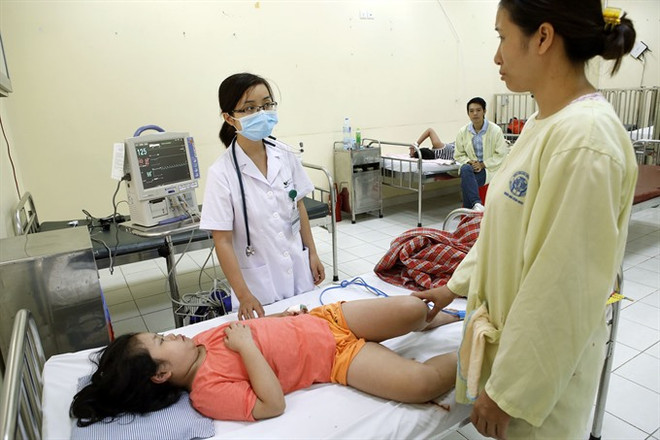 Some 30 per cent of patients at the National Children’s Hospital (NCH) suffer from drug-resistant bacteria stemming from improper use of antibiotics.(Source: VNA)
Some 30 per cent of patients at the National Children’s Hospital (NCH) suffer from drug-resistant bacteria stemming from improper use of antibiotics.(Source: VNA)Hanoi (VNA) - Some 30 percentof patients at the National Children’s Hospital (NCH) suffer fromdrug-resistant bacteria stemming from improper use of antibiotics.
Doctors are warning parentsagainst buying medicines for their children without doctors’ prescription.Besides living environment or antibiotic residues in food, dosing withoutconsulting a doctor is the main reason for drug resistance.
NCH examines about 4,000patients and treats 1,700 inpatients a day. Among them are 300 children usingmedical ventilators and oxygen concentrators, and 70 to 80 patients withcatheters. Most of the inpatients were transferred from provincialfacilities with these medical devices, increasing the high risk ofhospital-acquired infection.
Hospital-acquiredinfections are getting worse, according to Tran Minh Dien, vice director ofNCH. “Many patients transferred to our hospital have antimicrobial resistance.Therefore, we have to identify cases of hospital-acquired infection to offersuitable treatment regimens,” said Dien.
Antimicrobial resistancecauses difficulties in treatment. Doctors and microbiologists have collaboratedto manage antibiotics used in treatment to control the consequences ofantimicrobial resistance.
Infection control andproper antibiotics usage are key factors to prevent hospital-acquiredinfection, according to Dien.
“Doctors need to practicegood screening and isolation. Medical staff and patient relatives,additionally, have to obey the procedure of sanitising to prevent infection,”he said. “In addition, doctors should be aware of proper antibioticsusage. Every six months, the hospital issues microbial reports for doctors todevelop decent medical regimens.”
Bacteria generally developgradual resistanceto a drug over a ten to 30-year period, but the misuse and overuse of antibiotics shortens this process.
Parents and doctors areadvised not use antibioticsfor every cold and cough, and only when patients suffer from infections - andeven then, a modest dose. They should stop taking antibiotics longer than necessary or ending the coursetoo early.
Overuse of antibiotics canallow bacteria tochange in some way that either protects them from the action of the drug orneutralises the drug. Onother hand, stopping using antibiotics too soon may create favorable conditionsfor bacteria to revive and become resistant from drugs.
Antimicrobial resistancecauses about 700,000 deaths per year globally, according to a reportby the World Health Organisation (WHO). Ten million people will die annually by2050 if the problem is not curbed.
In August 2017, Vietnam adopteda National Action Plan to tackle the overuse of antimicrobials in livestock andfisheries in an effort to control antimicrobial resistance.-VNA



























